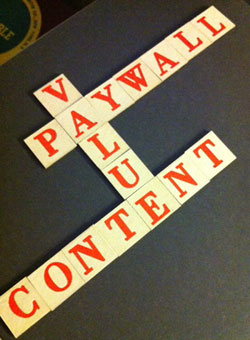 Daily Beast blogger Andrew Sullivan announced last week that he will begin charging readers to access his blog, The Dish. This is very big news in the journalism world, where the question of whether readers will actually pay for good content rages. But it also carries with it a lesson for associations – and really for anyone who has a website that they want people to visit.
Daily Beast blogger Andrew Sullivan announced last week that he will begin charging readers to access his blog, The Dish. This is very big news in the journalism world, where the question of whether readers will actually pay for good content rages. But it also carries with it a lesson for associations – and really for anyone who has a website that they want people to visit.
Sullivan and his small team of partners and fellow writers are banking on their relationship with their audience to translate into financial success. Their readers, they believe, are loyal enough to pay at least $19.99 per year to continue having unfettered access to The Dish.
Whether they’re right remains to be seen. I. for one, hope they are. I have deep roots in news and journalism, and it is a business that is struggling desperately to survive. If Sullivan’s team can prove that journalists and former journalists aren’t the only people who know that good reporting doesn’t come cheap, the world will be a better place. Sullivan says his team decided that “getting readers to pay a small amount for content was the only truly solid future for online journalism.” I’m not entirely convinced that’s true, but it is at minimum one of very few options available.
The value of content and community
But that’s about journalism and the news business, and this post is about associations – specifically, what associations can learn from Sullivan’s decision. The lessons here for everyone are about the value of good content, and the value of community.
The success of your association depends on the strength of your relationship with your members.
If you work for an association, the only paywall you’re probably ever going to erect is the one that comes with the cost of membership. Some or all of your content likely is, or eventually will be, available only to your members. But whether or not you actually charge directly for content, you certainly hope members – end even potential members – will come to your website. And that depends on the quality of what they find there.
In an analysis of Andrew Sullivan’s decision, Nieman Journalism Lab quoted NYU journalism professor Jay Rosen as saying its success depends on the loyalty of The Dish’s readers: “Whether you can charge for content ‘depends on how strong the relationship is between you and the regular users of your site.’ ” At its core, the success of your association depends on the same thing: the strength of your relationship with your members.
Websites should provide value to members
Your website is a place where you should be both showcasing and building that relationship. Make sure you have a wealth of rich, valuable information that members can profit from in their daily lives. Use your website – and your social media – to engage in conversation with your members. Ask what they need, so you can give it to them. Ask their opinions, so you can respond and represent them. Prove your value by helping members every single day (great content), and by listening to what they have to tell you (great community).
Sullivan says his early days as a blogger showed him the value of entering into a relationship with his readers. “The more what started as a monologue became a dialogue,” he wrote in his announcement. “The dialogue eventually ceded to a sprawling conversation.”
Associations should aim for the same.
